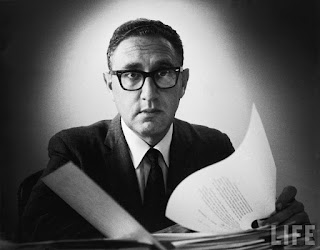
In what seems to be a response to the Corker/Inhofe op-ed in the Wall Street Journal of last week, elder statesmen George Shultz, Bill Perry, Henry Kissinger and Sam Nunn reiterated their call for more urgent progress on reducing nuclear risks, particularly proliferation. This is their fifth article since their original joint op-ed published in January 2007 calling for world leaders to address urgent nuclear dangers.
Although their latest dictum points out that “the number of nuclear weapons in the world today is less than one-third of the total in 1986 at the time of the Reagan-Gorbachev Reykjavik summit”, much more, in their view, needs to be done. The world since the Cold War has changed. No longer, they opine, do we have a situation in which Soviet-American deterrence was guaranteed by mutually assured destruction. Instead, we have a “large and growing number of nuclear adversaries” that are confronting “multiple perceived threats”. Restraint, similar to what was created during the Cold War, cannot be sustained. The risks are far too great. Global leaders must reduce and eventually eliminate them. The steps they need to take to do so, in order to move past what the authors refer to as the “dangerous complacency”, are as follows:
- Secure nuclear materials to prevent catastrophic nuclear terrorism;
- Change the deployment patterns of the two largest nuclear powers to increase decision time for leaders;
- Consider going below New START levels in strategic weapons, but only with a) strict reciprocity; b) demonstrable verification; and c) providing adequate and stable funding for the long-term investments required to maintain high confidence in our nuclear arsenal;
- Create a “verification initiative” that involves the U.S. nuclear weapons laboratories and global scientific experts in developing essential technologies and innovations for reducing and controlling nuclear weapons and materials.
Importantly, Schultz, Perry, Kissinger and Nunn put tactical, or non-strategic, nuclear weapons on the table. In their words, “It must be recognized that as some other nuclear-armed states are building up their inventories, or if new nuclear powers emerge, U.S. and Russian nuclear reductions face an inherent limit.”
They also note that a successful approach to reducing nuclear dangers would benefit from formation of a “coalition of the willing” that would “help establish priorities and achieve progress on specific steps.”
The second Obama administration is nearly a month and a half old and many in the arms control and nonproliferation communities are awaiting a follow-up to the 2009 Prague speech. Talks with Iran have faltered and North Korea under Kim Jong-Un has conducted its third nuclear test. Today, the United Nations Security Council unanimously approved a new package of sanctions against North Korea for the test, imposing penalties on North Korean banking, travel and trade. The isolated autocracy responded by talking, for the first time, about pre-emptive nuclear strikes: “Now that the U.S. is set to light a fuse for a nuclear war, the revolutionary armed forces of the DPRK will exercise the right to a pre-emptive nuclear attack to destroy the strongholds of the aggressors and to defend the supreme interests of the country,” a spokesman of the North Korean Foreign Ministry said in a Korean-language statement carried by the North’s official Korean Central News Agency.
Against this backdrop, the four statesmen’s call for more progress on non-proliferation is timely. The question, however, is whether or not the Obama administration has the creativity and resolve to address these challenges in a meaningful way.